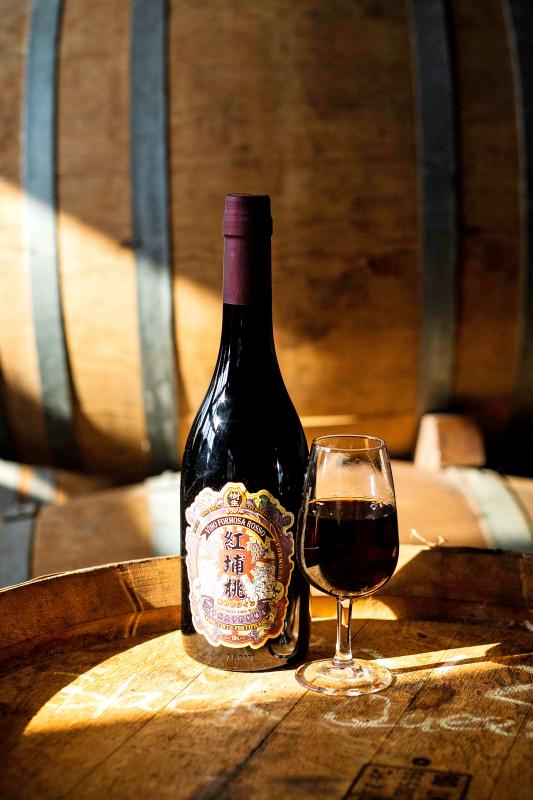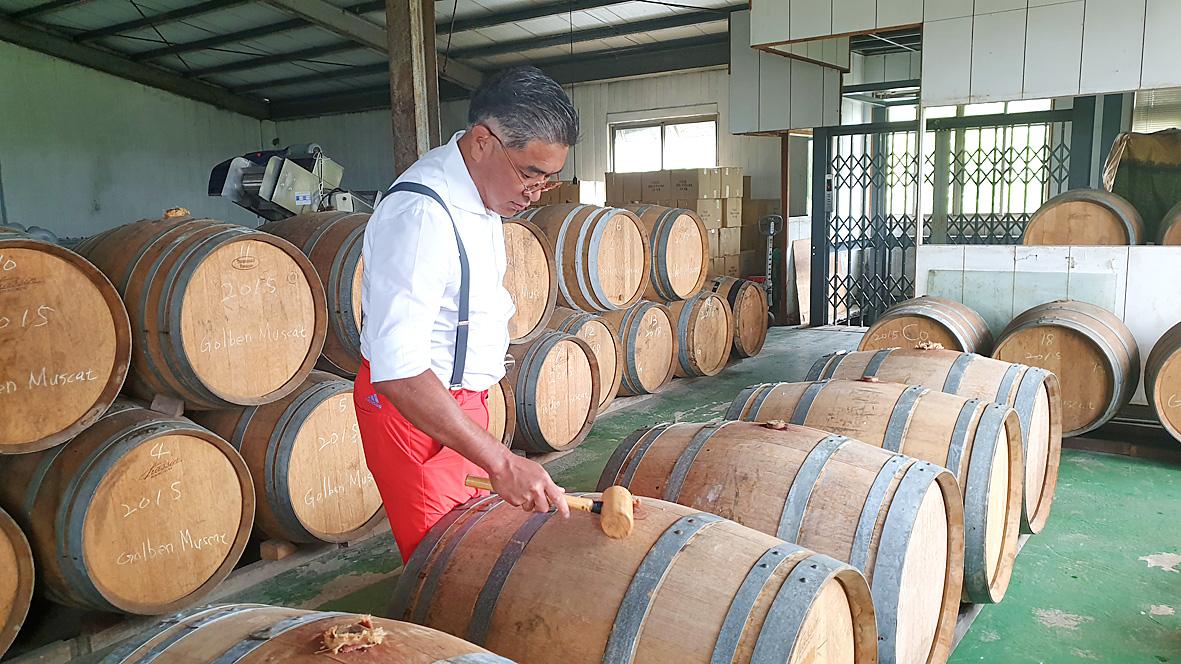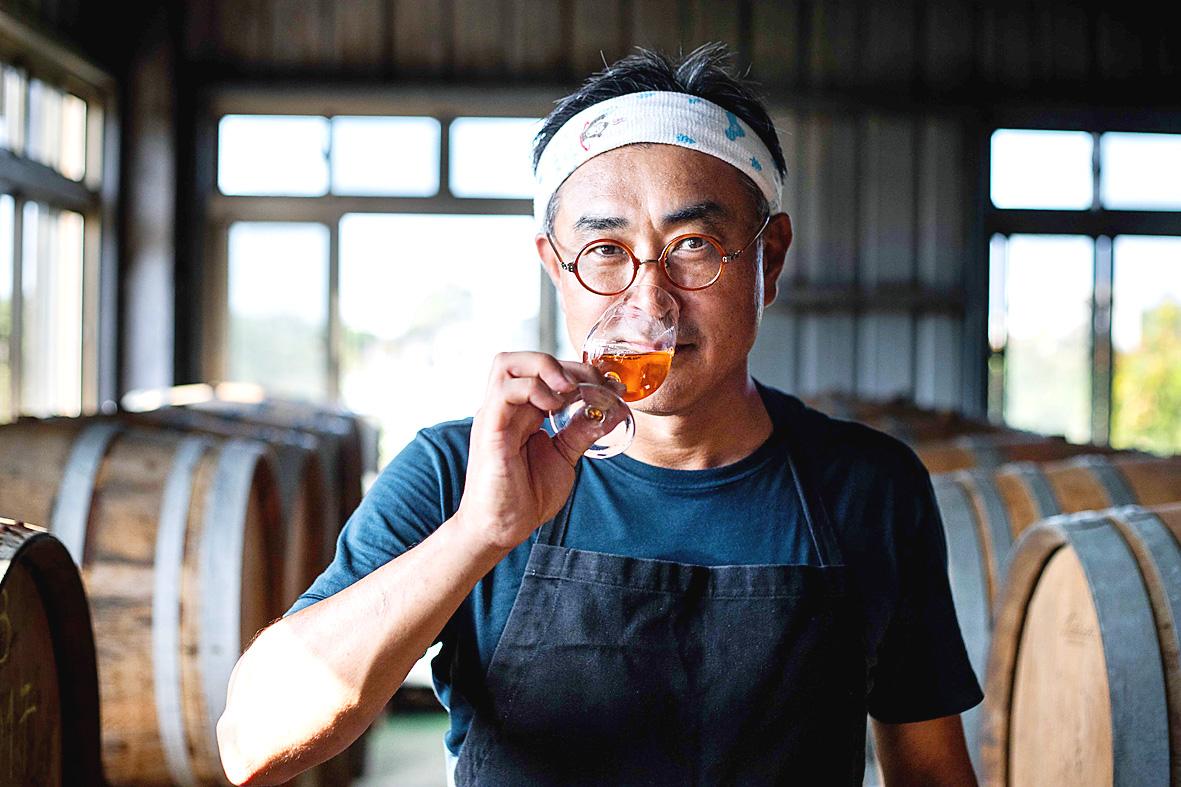Chen Chien-hao (陳千浩) never tasted proper red wine until he was 23. It was 1991, when the only wine available in Taiwan was the state-produced rose (玫瑰紅), typically consumed with Apple Sidra soda (蘋果西打) and ice — much to the shock of Europeans he encountered while studying hotel management at Les Roches, a top-ranked hospitality school in Switzerland.
“I asked my teacher, why is this so astringent?” Chen says. “It tasted terrible. It was culture shock.”
At that time, winemaking was still illegal in Taiwan because of the government monopoly. But more than two decades later in 2014, Chen’s Vino Formosa, a dessert wine made in collaboration with Taichung’s Shu Sheng Leisure Domaine (樹生酒莊), won its first international gold medal. Earlier this month, both red and white varieties of Vino Formosa claimed top prizes in their respective categories at the Vinalies Internationales Competition in Paris — the first time Chen claimed double gold.

Photo courtesy of Marion Vercelot
While Taiwan’s grape varieties, climate and winemaking culture cannot compare to that of viticultural meccas such Chile and France, Chen was able to make use of the nation’s disadvantages to create a unique product after years of experimentation.
“The taste of a wine depends on a locale’s natural surroundings and culture,” Chen says. “There is no technology that can reproduce this taste in another place.”
MAKING OF A WINE GURU

Photo: Han Cheung, Taipei TImes
Chen’s wines are made from the Black Queen and Golden Muscat grape varieties, which the government introduced from Japan and the US in the 1950s to make wine. Hung Chi-pei’s (洪吉倍) family have been growing these grapes for about 60 years in Taichung’s Waipu District (外埔); he says this area used to boast over 300 hectares of vineyards.
Hung’s family sold their grapes exclusively to what’s known today as the Taiwan Tobacco & Liquor Corp, which was the nation’s sole producer of alcoholic beverages and cigarettes for most of the 20th century. This monopoly was only abolished in 2002 when Taiwan joined the WTO. Hung says most of the surrounding grape farmers then turned to other crops such as dragon fruit, but he held on to the family tradition.
When Chen began studying enology at the University of Burgundy in 1997, not only was he the first Asian student in the program, he was the only one who came from a country where winemaking was illegal.

Photo courtesy of Marion Vercelot
“I didn’t think that much and went ahead,” he says. “I just wanted to achieve my dream.”
Chen was teaching at Kaohsiung University of Hospitality and Tourism when the government began issuing private licenses and assisting its former grape providers in the art of winemaking. They sought him out in 2004 and took him to several wineries to help enhance their operations, including Hung’s.
Hung’s wines didn’t fare too badly in the market, but Chen noticed a bitter taste caused by their equipment, which crushed the seeds and stems along with the fruit. He advised them to import a proper grape crusher and destemmer from France, and thought his job was done.
Soon he received a call from Hung: “The machine is here.” Great, Chen replied. “But you need to teach us how to use it,” Hung said. In the summer of 2005, Chen brought his students to the winery and began their grand experiment.
FIXING THE ‘FOXY’ FLAVOR
There was a sharp learning curve. Chen had no practical experience despite his credentials, and Taiwan’s climate was simply not suited for making wine. Its annual rainfall was significantly higher than acclaimed winemaking regions, and its frequent typhoons often led to early harvests when the grapes were still sour. Plus, while these hybrid grapes were hardy and resistant to heat and humidity, they had an unpleasant “foxy” flavor.
“Only one percent of the world uses hybrid grapes to make wine,” Chen says. “With inferior climate and varieties, it was almost impossible to make good wine in Taiwan.”
Chen rolled out a map and looked for wine-producing regions with similar conditions. He found two locations — Tahiti and Madeira, the latter a Portuguese island in the Atlantic Ocean. He ordered three bottles of wine from Tahiti and was not impressed. Madeira’s story, however, intrigued him. They make fortified wine by putting the barrels through thermal treatment in hothouses. Chen traveled to Madeira to learn their secrets as a freelance wine writer.
Back in Taiwan, he used solar power to simulate the hothouse conditions, and the foxy taste disappeared after three months. However, the overall product was still far from ideal. After letting the wine sit for about three years, it developed candied fruit and tropical fruit overtones, giving Chen hope that he was on the right track.
Due to Taiwan’s heat, the wine evaporated quickly — about 10 percent per year. After five years, only half the barrel’s content was left, but its taste had vastly improved through the Maillard reaction.
“The original negative quality of Taiwan’s grapes — sourness — was still there, since sourness doesn’t evaporate,” Chen says. “But this sourness became the deciding factor for the wine’s success, as it rounded out the overall taste and made it more refreshing. With other dessert wines such as port and cream sherry, you don’t want to drink too much at once. But the sourness made our wine palatable in larger quantities.”
Chen started entering Vino Formosa into international competitions in 2011. In 2015, while accepting an award in the UK, he ran into the winemaker he interviewed in Madeira.
“You were a spy!” the man exclaimed, but acknowledged that this taste could only be produced in Taiwan due to the various unique factors.
REVIVING PAST SPIRITS
After a successful collaboration with single-malt whiskey giant Glenfidditch using Vino Formosa barrels, Chen concluded that he had pushed Taiwanese wine as far as he could. It was impossible to compete with foreign wines commercially on price, since his production remained small.
The current waiting list to purchase Vino Formosa is up to five years.
Chen did some digging and discovered that the Japanese used to make sweet potato and rice liquor in Taiwan, but production ceased when they left the country in 1945. He went to Japan and served as an apprentice to learn their trade, beginning from sweeping the floors.
He then headed to Taiwan’s largest seed bank and found a discontinued variety of rice suitable for distilling called Yoshino No. 1. “I found a farmer on the east coast just as crazy as I am, and we began recultivating this rice,” he says.
Chen and Hung are building a four-level gravity flow winery next to the current establishment to bring back a variety of spirits that used to be produced in Taiwan using organic methods.
“I want to recreate the flavors of the past,” he says. “I want to revive Taiwan’s long-lost alcohol making culture, and inspire a ‘Taiwan wine and spirit renaissance.’”
Warning: Excessive consumption of alcohol can damage your health.

April 14 to April 20 In March 1947, Sising Katadrepan urged the government to drop the “high mountain people” (高山族) designation for Indigenous Taiwanese and refer to them as “Taiwan people” (台灣族). He considered the term derogatory, arguing that it made them sound like animals. The Taiwan Provincial Government agreed to stop using the term, stating that Indigenous Taiwanese suffered all sorts of discrimination and oppression under the Japanese and were forced to live in the mountains as outsiders to society. Now, under the new regime, they would be seen as equals, thus they should be henceforth

Last week, the the National Immigration Agency (NIA) told the legislature that more than 10,000 naturalized Taiwanese citizens from the People’s Republic of China (PRC) risked having their citizenship revoked if they failed to provide proof that they had renounced their Chinese household registration within the next three months. Renunciation is required under the Act Governing Relations Between the People of the Taiwan Area and the Mainland Area (臺灣地區與大陸地區人民關係條例), as amended in 2004, though it was only a legal requirement after 2000. Prior to that, it had been only an administrative requirement since the Nationality Act (國籍法) was established in

With over 100 works on display, this is Louise Bourgeois’ first solo show in Taiwan. Visitors are invited to traverse her world of love and hate, vengeance and acceptance, trauma and reconciliation. Dominating the entrance, the nine-foot-tall Crouching Spider (2003) greets visitors. The creature looms behind the glass facade, symbolic protector and gatekeeper to the intimate journey ahead. Bourgeois, best known for her giant spider sculptures, is one of the most influential artist of the twentieth century. Blending vulnerability and defiance through themes of sexuality, trauma and identity, her work reshaped the landscape of contemporary art with fearless honesty. “People are influenced by

The remains of this Japanese-era trail designed to protect the camphor industry make for a scenic day-hike, a fascinating overnight hike or a challenging multi-day adventure Maolin District (茂林) in Kaohsiung is well known for beautiful roadside scenery, waterfalls, the annual butterfly migration and indigenous culture. A lesser known but worthwhile destination here lies along the very top of the valley: the Liugui Security Path (六龜警備道). This relic of the Japanese era once isolated the Maolin valley from the outside world but now serves to draw tourists in. The path originally ran for about 50km, but not all of this trail is still easily walkable. The nicest section for a simple day hike is the heavily trafficked southern section above Maolin and Wanshan (萬山) villages. Remains of